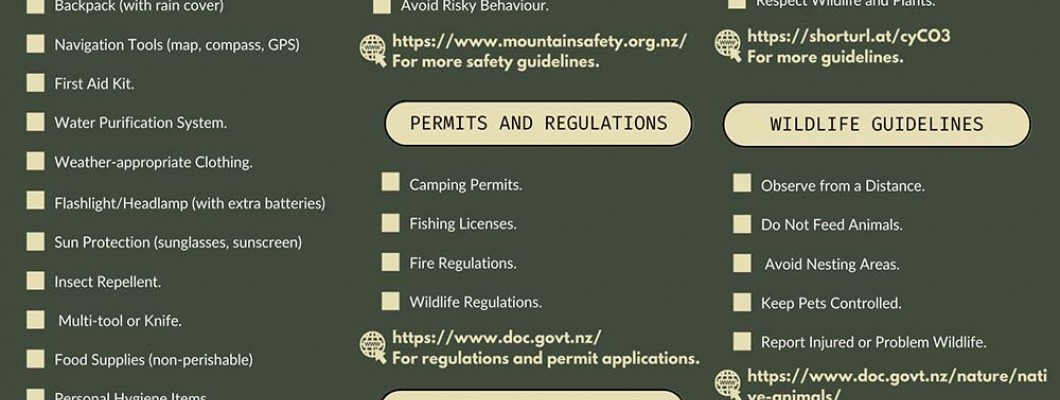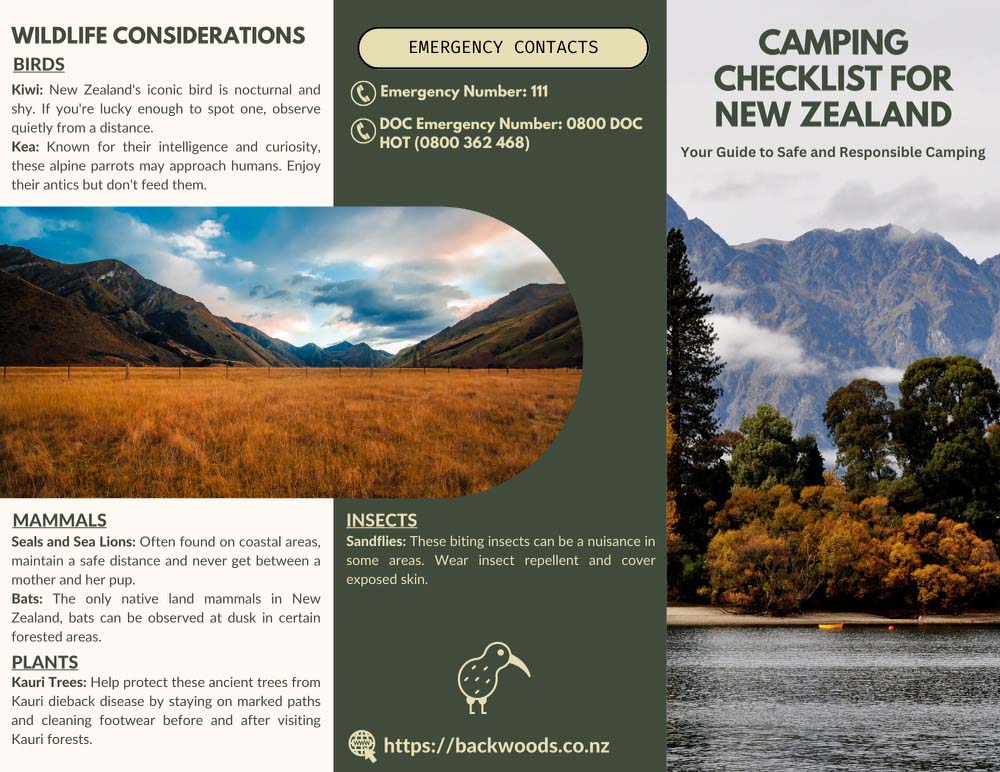
Welcome to New Zealand's Great Outdoors!
New Zealand, a land of breathtaking landscapes and diverse ecosystems, offers some of the world's most unforgettable camping experiences. From the rugged peaks of the Southern Alps to the serene beaches of the North Island, the opportunities for adventure are endless.
Whether you're a seasoned explorer or a first-time camper, our comprehensive New Zealand Camping Checklist is designed to guide you through every step of your journey. This brochure covers everything you need to know, including essential gear, safety regulations, wildlife considerations, weather and terrain tips, sustainable camping practices, and much more.
With links to government resources and expert advice, this checklist ensures that you are well-prepared and informed, allowing you to fully immerse yourself in the natural beauty of New Zealand while respecting and preserving its unique environment.
Embark on your adventure with confidence and responsibility.

Download Checklist Brochure
Essential Gear
Make sure to pack the following items for a safe and comfortable camping experience:
- Tent (with stakes and guylines)
- Sleeping Bag (appropriate for the season)
- Cooking Equipment (stove, fuel, utensils)
- Backpack (with rain cover)
- Navigation Tools (map, compass, GPS)
- First Aid Kit
- Water Purification System
- Weather-appropriate Clothing
- Flashlight/Headlamp (with extra batteries)
- Sun Protection (sunglasses, sunscreen)
- Insect Repellent
- Multi-tool or Knife
- Food Supplies (non-perishable)
- Personal Hygiene Items
- Emergency Whistle
Safety Regulations
Follow these guidelines to ensure your safety while camping and hiking:
- Check Weather Forecasts: Be aware of weather conditions.
- Inform Someone of Your Plans: Let someone know your itinerary.
- Follow Trail Markings: Stay on marked trails.
- Avoid Risky Behavior: Don't take unnecessary risks.
- New Zealand Mountain Safety Council - For more safety guidelines.
Permits and Regulations
Understand and comply with the following regulations:
- Camping Permits: Obtain necessary permits for camping.
- Fishing Licenses: If fishing, ensure you have the required license.
- Fire Regulations: Follow local fire restrictions and guidelines.
- Wildlife Regulations: Respect wildlife and keep a safe distance.
- Department of Conservation - For regulations and permit applications.
Weather and Terrain Consideration
Prepare for New Zealand's diverse terrain and weather:
- Check Weather Forecasts: Adapt plans according to the weather.
- Understand Terrain: Know the terrain of your camping location.
- Tide Information: If near the coast, be aware of tide timings.
- MetService - For weather forecasts.
Emergency Contacts
Keep these contacts handy:
- Emergency Number: 111
- Nearest Hospitals/Medical Facilities: Find here
Sustainable Camping Practices
Follow these guidelines for eco-friendly camping:
- Leave No Trace: Pack out all trash.
- Use Established Campsites: Camp in designated areas.
- Minimize Campfire Impact: Use a camp stove instead of making a fire.
- Respect Wildlife and Plants: Do not disturb or feed animals.
- Eco-friendly Practices - For more guidelines.
Wildlife Considerations
New Zealand is home to a unique array of flora and fauna. Here's what you need to know to enjoy and protect the natural environment:
General Guidelines
- Observe from a Distance: Use binoculars or a camera with a zoom lens to view wildlife.
- Do Not Feed Animals: Human food can harm wildlife and alter their natural behaviors.
- Avoid Nesting Areas: Stay clear of nesting birds and other sensitive wildlife habitats.
- Keep Pets Controlled: If pets are allowed, keep them on a leash and under control.
- Report Injured or Problem Wildlife: Contact local authorities if you encounter injured animals or wildlife behaving unusually.
Specific Wildlife Considerations
Birds
- Kiwi: New Zealand's iconic bird is nocturnal and shy. If you're lucky enough to spot one, observe quietly from a distance.
- Kea: Known for their intelligence and curiosity, these alpine parrots may approach humans. Enjoy their antics but don't feed them.
Mammals
- Seals and Sea Lions: Often found on coastal areas, maintain a safe distance and never get between a mother and her pup.
- Bats: The only native land mammals in New Zealand, bats can be observed at dusk in certain forested areas.
Insects
- Sandflies: These biting insects can be a nuisance in some areas. Wear insect repellent and cover exposed skin.
Plants
- Kauri Trees: Help protect these ancient trees from Kauri dieback disease by staying on marked paths and cleaning footwear before and after visiting Kauri forests.
Links and Resources
- Department of Conservation's Wildlife Guidelines
- New Zealand Bird Watching Guide
- Marine Mammal Viewing Guidelines
This section provides both general guidelines and specific information about some of New Zealand's unique wildlife and plants. It emphasizes respectful and responsible behavior to ensure the protection of these natural treasures.





Leave a Comment